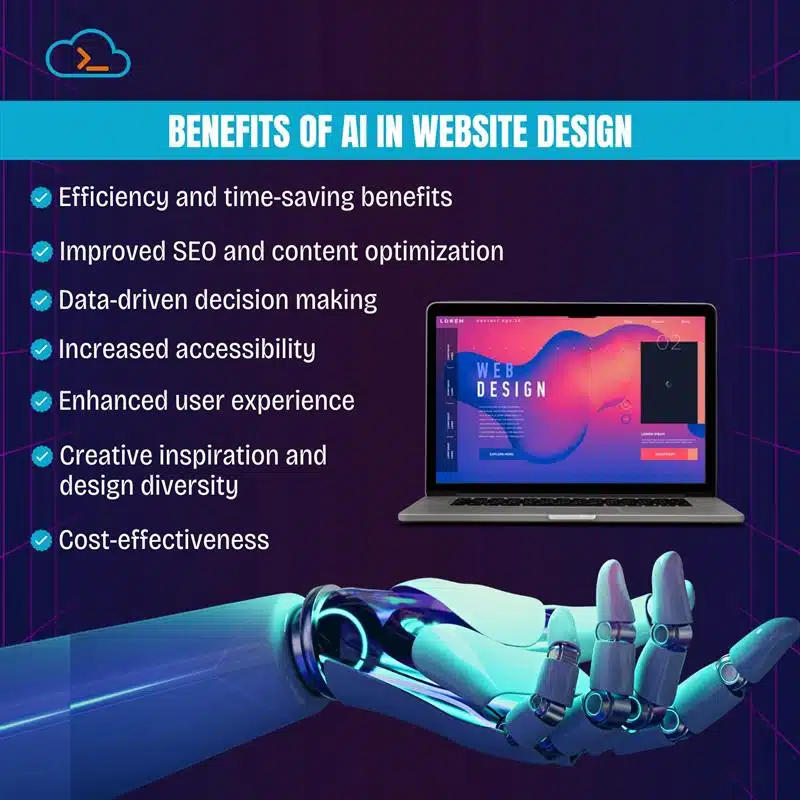Aparna Sushumna
Benefits Of AI in Website Design
AI is transforming website building and design by bringing efficiency, creativity, and personalization to the forefront. Here are some key benefits:
1. Efficiency and time-saving benefits
AI enhances web design by automating repetitive tasks like layout creation, code generation, and content population, allowing designers to focus on high-level creative work. AI-powered tools streamline processes, improve efficiency, and reduce manual effort, resulting in quicker project turnarounds. Additionally, AI-driven platforms accelerate prototype creation, enabling faster testing and iterative cycles.
2. Improved SEO and content optimization
AI can assist with generating content ideas, layouts, and keyword suggestions that boost SEO, making sites more discoverable and engaging. AI can automatically tag multimedia elements and create blog posts with relevant keywords, ensuring they’re accessible and optimized for search engines. Content marketing services integrate AI-based solutions with content creation that help brands promote their product.
3. Data-driven decision making
AI can process vast amounts of user interaction data, providing valuable insights into which design elements work best. This helps designers make informed decisions based on real-world usage rather than guesswork. Some AI tools can autonomously test design variations and refine layouts to maximize user engagement.
4. Increased accessibility
AI can create responsive designs and adaptive interfaces that adapt to individual users’ needs, including those with disabilities. For instance, it can suggest design elements optimized for screen readers or users with color blindness. AI enables more inclusive designs by supporting voice commands, gestures, and other non-traditional inputs.
5. Enhanced User Experience
AI analyzes user patterns, behavior, and preferences to provide personalized recommendations and content. AI-powered tools can optimize user interfaces and enhance user engagement. AI can improve search engine optimization, website usability, data privacy, and accessibility and enables hyper-personalization and context-aware experiences.
6. Creative inspiration and design diversity
AI tools can suggest color schemes, layouts, or design elements based on a brand’s style and user preferences, giving designers fresh ideas and accelerating creativity. AI can analyze brand guidelines and ensure that all elements of content creation on a site maintain a cohesive look and feel across all pages.
7. Cost-effectiveness
AI in web design reduces the need for large design teams by automating routine tasks, making it a cost-effective solution for businesses of all sizes. With AI managing repetitive work, design and development teams can work more efficiently, optimizing time and resources without compromising quality. Ultimately, AI empowers designers to work smarter, combining speed, creativity, and data-driven insights to enhance the design process.

Challenges of AI in Website Design
Though generative AI creates an edge in web design, this transformation has its drawbacks.
a. Technical Limitations
AI algorithms may struggle with complex design requirements and technical limitations. AI-powered tools may require significant upfront investment and resources. AI may have practical limitations in terms of customization and personalization of user queries. AI and the latest tools may require continuous learning and adaptation to stay relevant.
b. Creative Limitations
AI-generated designs and concepts may lack the creativity and originality of human designers. AI may struggle to understand human emotions and nuances. AI may not be able to replicate the human touch and intuition. AI may require some human input and oversight to ensure design integrity.
c. Dependence on Data Quality
AI algorithms rely heavily on high-quality data for accurate and fair design recommendations. If the data is poor—meaning it has mistakes, is incomplete, or is biased—it can lead to unreliable or unfair design recommendations. To ensure optimal outcomes, continuous refinement, updates, and quality data are essential, enabling AI to adapt to changing trends and user behavior effectively.
Future of AI in Website Design
The Role of Human Designers in AI-Powered Design
Human designers play a crucial role in AI-powered design, providing creative direction, data analysis, and oversight of machine learning algorithms. They can also work alongside AI tools to enhance and refine design recommendations. Human designers can ensure that AI-generated designs meet brand identity and user experience requirements and provide emotional depth and resonance to AI-generated designs.
Evolving role of AI in web design
AI is estimated to take central control in web development, automating repetitive tasks and enhancing personalization. AI will optimize user experiences and improve efficiency in web design. AI will create more innovative and creative designs for expert web developers. AI will revolutionize the web design industry.
Strategies to integrate AI along with human creativity
Designers should view AI as a tool to augment their human creativity. AI should inform creative decisions, not replace human intuition. Human oversight is essential to ensure design integrity and user-centricity. The integration of humans and machines is key to further effective AI integration.
Best Practices for Implementing AI in Website Design
Start with clear goals and objectives for AI integration. With the assistance of the best digital marketing agency in India in India, choose the right AI tools and platforms for your needs. Ensure high-quality data for accurate design recommendations. Provide human oversight and creative direction. Continuously refine and update AI algorithms to adapt to changing trends and user preferences.
Key Takeaways
- Several AI platforms are emerging to automate web design and improve the quality and performance of websites in general.
- AI in web development can improve efficiency, reduce costs, and enhance user experience.
- AI platform offers users a variety of prebuilt templates and an extensive set of automated features.
Conclusion
AI in website design offers benefits such as efficiency, time savings, and enhanced user experience. However, AI in website performance also presents challenges such as technical limitations, ethical concerns, creative limitations, and dependence on data quality. Human and AI collaboration is essential for effective AI integration. The future of AI in website design is promising, with predictions of increased automation, personalization, and innovation. Best practices for implementing AI in website design include starting with clear goals, choosing the right tools, ensuring high-quality data, providing human oversight, and continuously refining and updating AI algorithms.
Frequently Asked Questions
Is AI good for websites?
Yes, AI is beneficial for websites. Though implementing an effective AI strategy requires careful planning, creativity and expertise, the rewards are substantial.
How will AI affect web design?
AI will transform web design by enhancing tools that shape a website’s look, layout, and user experience, making it a powerful force in redefining industry standards.

